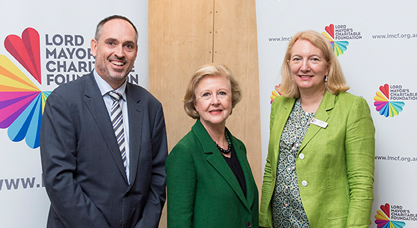Amongst other community initiatives, over the last year we have worked on:
- Addressing youth unemployment including for young people with disabilities and from culturally diverse backgrounds;
- Supporting women and children, and older men who are homeless;
- Tackling the challenge of older women living in long term income poverty; and
- Giving young Indigenous people a voice through the Koorie Youth Summit.
This week at the Lord Mayor’s Charitable Foundation’s annual Inspiring Philanthropy event, we had the rare opportunity of reflecting on our work in philanthropy through the lens of a human rights framework when Professor Gillian Triggs, President of Australian Human Rights Commission, spoke to us about the connections between philanthropy and human rights.
I have been so impressed by the work of the Australian Human Rights Commission on protecting the economic participation of older people – the Power of Oldness video captures this well. As a Foundation, we have also been working on this issue through the commissioning of the Time of Our Lives Report? by Professor Susan Feldman and Dr Harriet Radermacher, which explores building opportunity and capacity for the economic and social participation of older Australian women.
Based on Recommendation 6 of the Time of Our Lives? Report, which is to “Collaborate and support government, corporate and community partnerships to focus on initiatives that ensure older women are encouraged to extend their working (and earning) lives as appropriate”, we convened a working group of Kildonan, Fitted for Work, Queen Victoria Women’s Centre, Good Shepherd and senior entrepreneurs to think through this issue. We then funded a feasibility study to imagine how a senior women’s enterprise hub could be planned and implemented. Kildonan and Fitted for Work are now finalising a proposal and we will be seeking funding partners for this important project.
Professor Triggs noted the leadership of Australia in disability and age discrimination legislation. She also asked us to think about the Foundation’s work on economic participation, homelessness and food security in the context of the United Nations Covenant on Economic, Social and Cultural Rights (1976). It is useful to read the Covenant again – here are two Articles which resonated with me.
Article 6 The States Parties to the present Covenant recognise the right to work, which includes the right of everyone to the opportunity to gain his living by work which he freely chooses or accepts, and will take appropriate steps to safeguard this right.
Article 11 The States Parties to the present Covenant recognise the right of everyone to an adequate standard of living for himself and his family, including adequate food, clothing and housing, and to the continuous improvement of living conditions.
Our focus as a foundation on Employment, Affordable Housing and Food Security, especially for older women, younger people with disabilities, younger and older people from culturally linguistically diverse backgrounds and Indigenous young people, makes sense within this context. Our annual report gives an overview of our impact in these areas.
A stable home and healthy food are fundamental to being able to attend school, learn, find and hold employment, and maintain mental and physical health.

L-R: Andrew Baxter - Chairman, Lord Mayor's Charitable Foundation; Professor Gillian Triggs - President, Australian Human Rights Commission; and Catherine Brown - Chief Executive Officer, Lord Mayor's Charitable Foundation. On a personal note, as a graduate of The University of Melbourne some (!) years ago, I was fortunate to have Professor Triggs as my lecturer for International Law. This helped spark an enduring commitment to work in roles that have in some way enhanced the equal access of all people to services and opportunities.
It is always surprising to be reminded that Australia does not have a Bill of Rights. This does not mean, however, that as a community we are not committed to equality of access and opportunity. There is a lot for us all to do.
How can philanthropy be a more active part of a positive conversation about a more equal community?
Catherine Brown
CEO